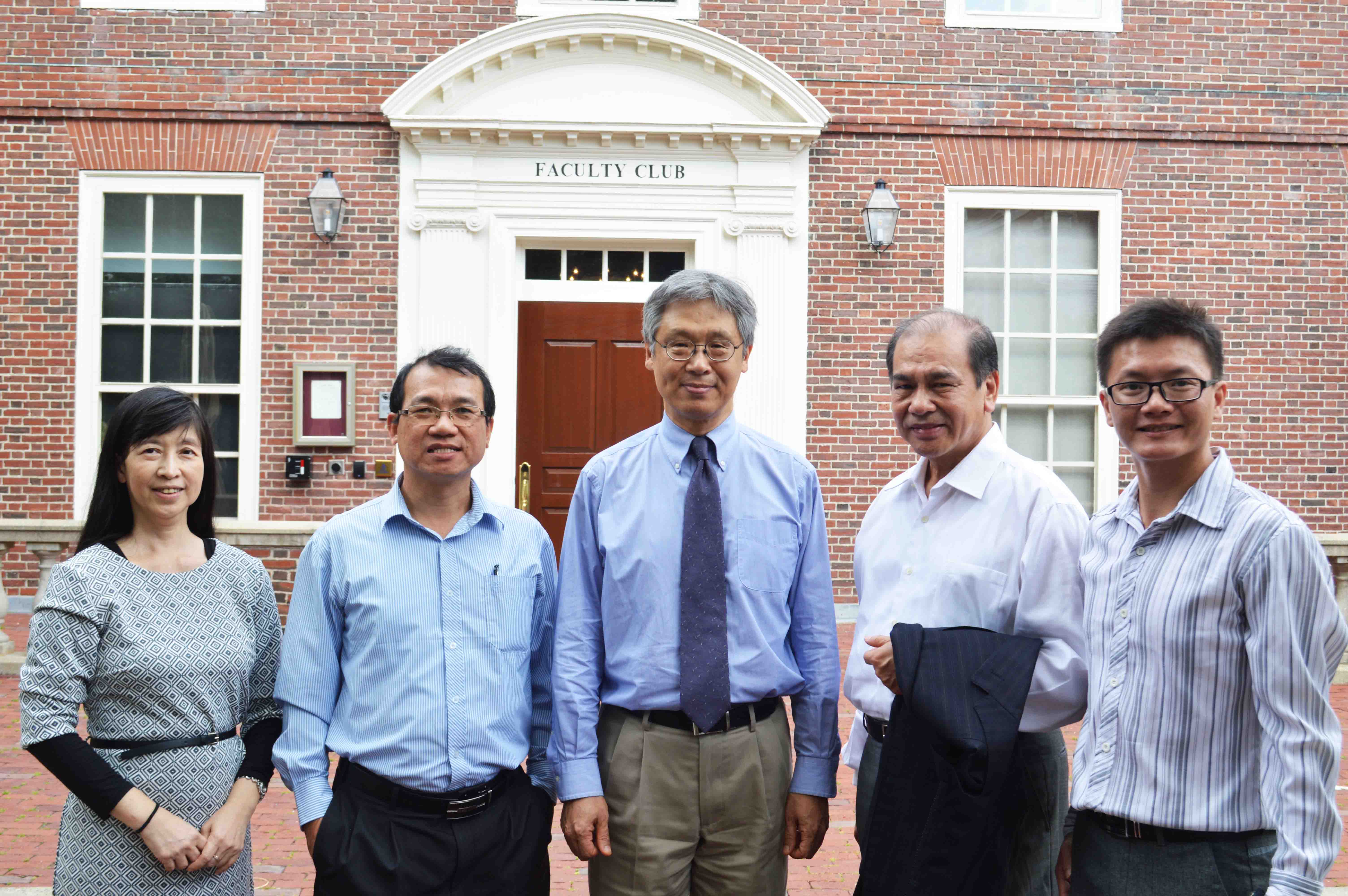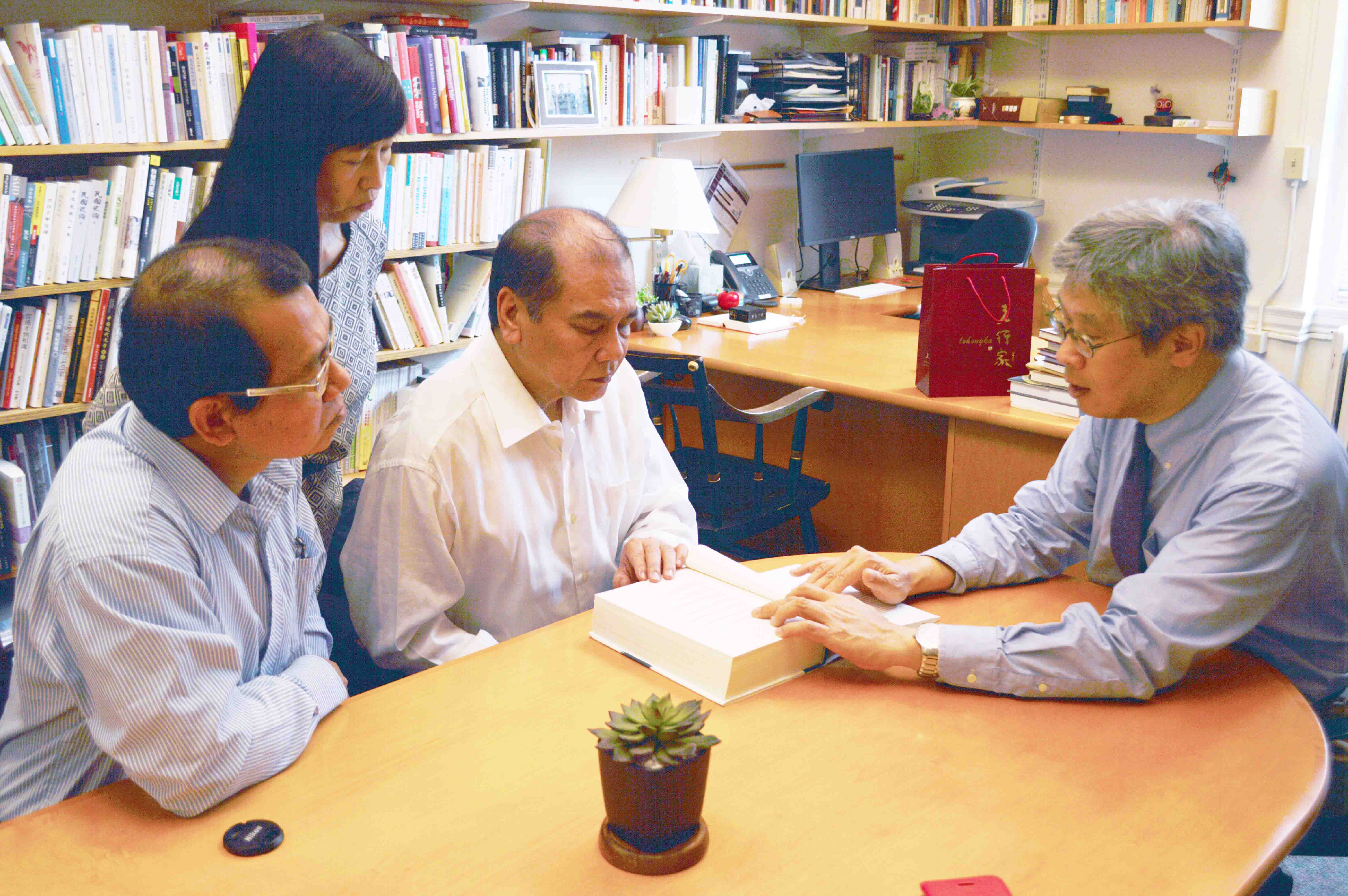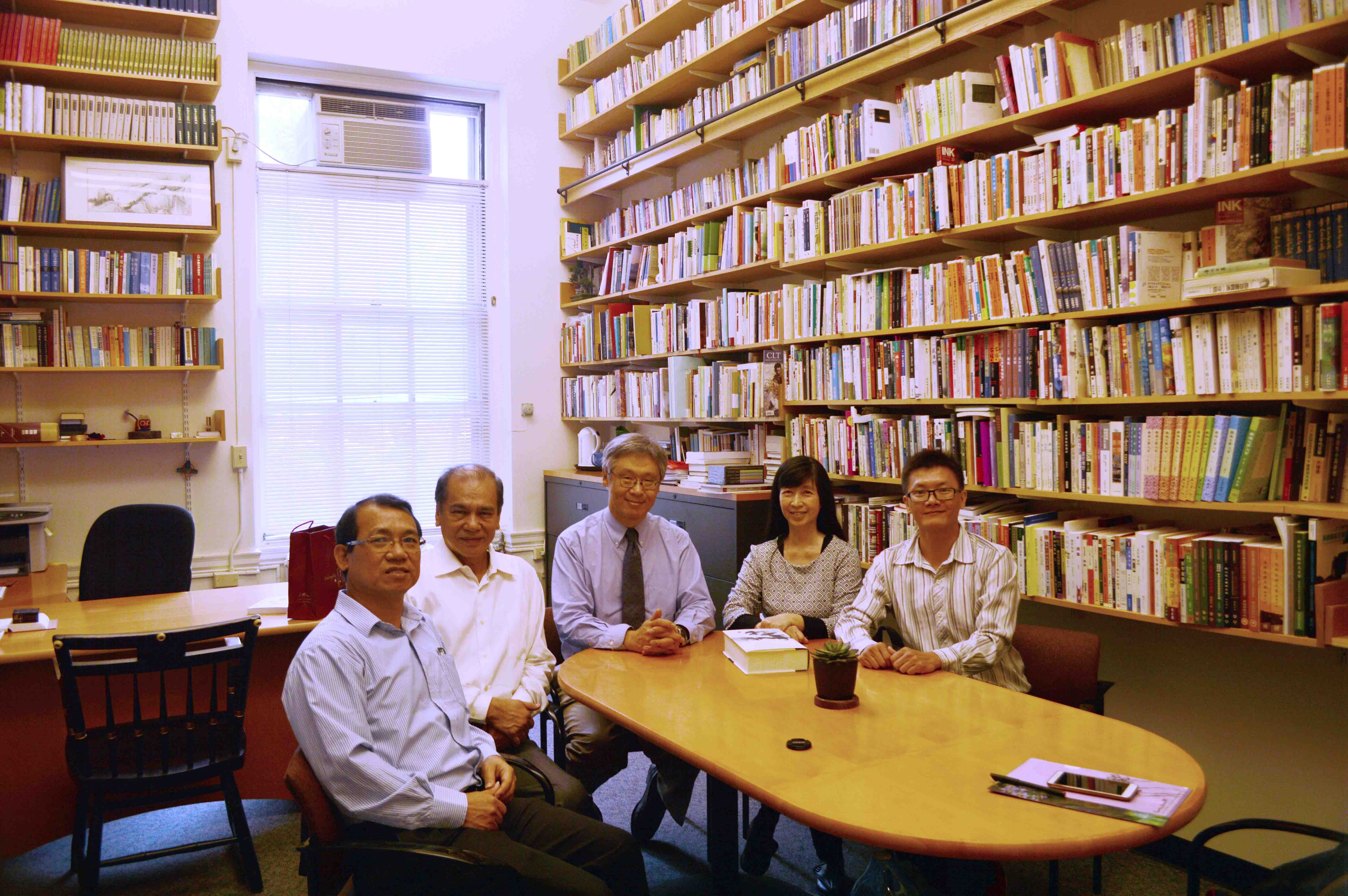

From left: Dr Seng, Dr Khor, Prof Wang, Tan Sri Chan and Chia at Harvard University
Following the return of UTAR Institute of Chinese Studies’ (ICS) Assoc Prof Dr Khor Boon Eng from Harvard University's Fairbank Center for Chinese Studies in 2016, bridges were built and efforts were made to increase the visibility of Malaysian Chinese (Mahua) Literature amongst scholars and academics in Harvard University.
During Dr Khor's stay at Harvard University as a visiting scholar, several academic presentations included “The Socio-cultural and Political Impact of Original Nation toward Chinese-American Writers: In the case of Shirley Geok-lin Lim”, “Why Sinophone? From the perspective of Malaysian Chinese Literature” and "Process and Practice: The Localization of Sinophone Malaysian Literature" were delivered. The talks were also attended by fellow visiting scholars from the Center and other postgraduates and observers from various countries, including the United States, Japan, Russia and China, who were intrigued in Dr Khor’s field of study.

Dr Khor during his presentation at Harvard University's Fairbank Center for Chinese Studies and Harvard China Culture Workshop
First official collaboration between Malaysia and the US on Malaysian Chinese Literature
This year, Dr Khor re-visited Harvard University to reinforce the initiative in promoting Malaysian Chinese Literature. This has culminated in the “Sinophone Malaysian Literary Studies: A Critical Reader (《马华文学研究批评读本》)” research project, which is a joint effort with Universiti Malaya (UM) Adjunct Professor Tan Sri Chan Kong Choy, UM’s Department of Chinese Studies Senior lecturer Dr Seng Yan Chuan and Shandong University’s Department of Chinese Studies PhD candidate Chia Jee Luen.
The academic team called on East Asian Languages scholar Prof David Wang Der Wei, who is the Edward C. Henderson Professor of Chinese Literature in Department of East Asian Languages and Civilisations, Harvard University, United States (US), in the mid of September 2017 to hold discussions about the research project’s publication.

Discussion with Prof Wang (right)
The publication will be written in English and aimed for non-Chinese speaking and reading scholars to understand the trends and orientation of Malaysian Chinese Literature while promoting academic exchanges between various ethnic groups and further allowing researchers, scholars and students in the US to master this area of study in a diversified and multidimensional mode.
Describing this opportunity as the fruition of his visit Harvard University as a visiting scholar in 2016, Dr Khor said, “The study on Malaysian Chinese Literature is and has been receiving rather wide attention in the US. One of the Harvard University East Asian Languages and Civilisations Department doctoral graduates, Dr Alison M. Groppe was the first Harvard-trained scholar who engage in Mahua Literature’s research. She also published her academic book titled ‘Sinophone Malaysian Literature: Not Made in China (《马华文学:非中国制造》)’ in 2013.” Other academics who have great interest in Mahua Literature studies include Prof Wang, Prof Shih Shu-mei (UCLA), Dr Brian Bernard (University of Southern California), Dr E.K. Tan (Stony Brook University) and others.
He continued, “English is still the primary language for the academics in the West. Therefore, the research on Mahua Literature, written in English, will provide a platform for the non-Chinese speaking and reading scholars and researchers to understand the trends and orientation of Mahua Literature, and bring the study of Mahua Literature to the international stage. Most importantly, it also allows our very own Malaysians who can’t read Chinese to understand the essence of Mahua Literature. Malaysia has always been a multi-racial society which resulted in us having diverse and rich literature resources. However, there seems to have a lack of communication and interaction between the races in the areas of comparative literature. If a literary work is not expressed in the target language of the audience, the message and essence will not be delivered. Therefore, we have to break the restrictions of language, ethnicity and the geography.”
During the recent US visit, Dr Khor was also invited to the University of Southern California’s US-China Institute to deliver a talk titled “Reaffirming or Resisting? Sinophone and Malay Literary Responses to Malaysia’s Dominant Discourse (马华文学与马来文学对马来西亚主导话语的回应)”, further deepening the interests on Malaysian Chinese Literature among the academics and students. “I was really impressed by the students’ deep interests in the topic. Their ability to think critically and view things from different perspectives also saw them asking interdisciplinary questions such as gender and politics. This has also inspired me to apply interdisciplinary research method when studying Mahua Literature.”
Research on Mahua Literature in ICS and Malaysia
An academic whose research interest is World Chinese Literature with specialisation in Mahua Literature, Dr Khor also introduced that Mahua Literature is one of ICS’s important research areas. “Over the years, ICS has been joined by many academics with mutual interest and passion in the area. Today, ICS has the most academics researching Mahua Literature in Malaysia.”
A firm believer that the study on Mahua Literature is a gem waiting to be discovered by many, Dr Khor is also delighted to learn that the research works by his postgraduate students have managed to intrigue researchers from home and abroad such as China and Taiwan as well. “Mahua Literature is receiving increasing attention in the world of Sinophone studies, such as in China, which resulted in the development of a number of research especially on Mahua Literature. Therefore, compared to these overseas researchers, we, Malaysian researchers of Mahua Literature, have the natural advantages and privileges in conducting the studies and research works. Therefore, Malaysian researchers should be motivated and more proactive than anyone else in these works,” suggested Dr Khor, who was also elated that the research works by his postgraduate students in Mahua Literature have been sought after as references.
The collaborative project on the publication of “Sinophone Malaysian Literary Studies: A Critical Reader” is the first collaboration between Malaysia and US on Mahua Literature research. With the blend of East (Malaysia)-meet-West (the US) group of expertise, the project begins in 2017 and is expected to be completed by 2020.

From left: Dr Khor, Tan Sri Chan, Prof Wang, Dr Seng and Chia after the discussion
© 2019 UNIVERSITI TUNKU ABDUL RAHMAN DU012(A).
Wholly owned by UTAR Education Foundation Co. No. 578227-M LEGAL STATEMENT TERM OF USAGE PRIVACY NOTICE